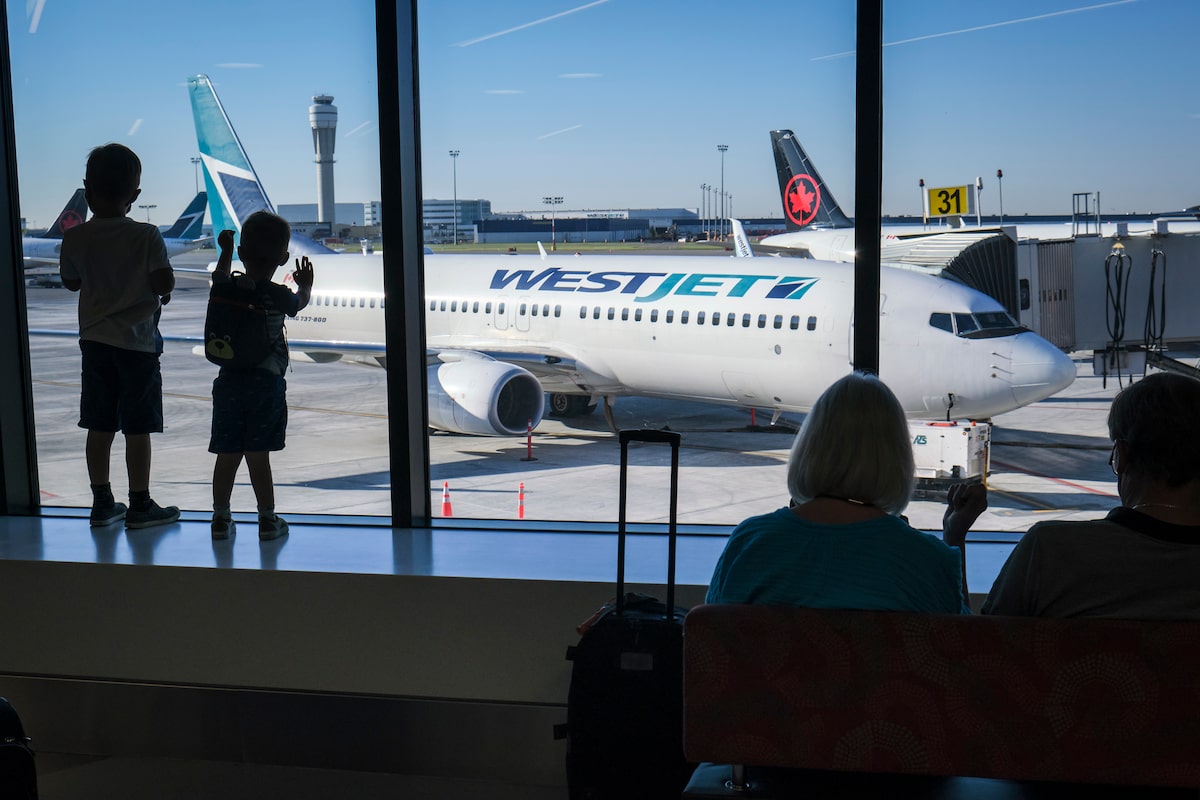Young boys look out at Air Canada and WestJet planes at Calgary International Airport in Calgary, on Aug. 31, 2022.Jeff McIntosh/The Canadian Press
When WestJet cancelled Neeta Gill and her family’s connecting flight, prompting them to purchase new tickets on another carrier, she turned to the Canadian Transportation Agency last year to seek a $5,000 reimbursement.
According to documents, Ms. Gill, eager to avoid a long wait after learning her complaint was number 54,849 in line, also filed a claim with B.C.’s Civil Resolution Tribunal, an online civil-dispute system that adjudicates specific small claims.
But the CTA, a federal regulator and quasi-judicial tribunal that handles air-travel complaints, issued a decision first. It denied her reimbursement for the $5,000 while ordering WestJet to refund the unused portion of the flight itinerary. The regulator has no internal appeal system, requiring passengers to go through a judicial review with the Federal Court of Canada when they want to dispute a decision.
The civil tribunal, in turn, dismissed her claim in a Dec. 12 ruling on grounds that the case had already been decided by the transportation agency. The Globe was unable to contact Ms. Gill for comment on the ruling.
Ms. Gill’s case contrasts last month’s win for a Yukon couple who was awarded $10,000 in compensation and damages in small-claims court for what one justice called a “horrendous experience” with Air Canada AC-T. Tosh Southwick, one of the Yukon plaintiffs, was advised to avoid filing a complaint with the transportation agency as it would likely prevent them from seeking and winning compensation in court.
The differing outcomes show how turning to the CTA can sometimes cost travellers a chance for remuneration and ability to appeal in civil-claims courts. And they add to the growing sentiment that the regulator is becoming a less effective avenue for protecting passengers.
Scrutiny around whether the agency is up to the challenge of taking on the airline industry has been brewing for years. But its ability to help passengers has faced renewed questions as the agency faces a mounting backlog of complaints, which reached 80,500 this fall – a 469-per-cent increase from fiscal year 2018-19.
CTA spokesperson Jadrino Huot said that since September, 2023, 58.3 per cent of decisions by the agency’s complaints resolution officer ordered the airline to provide the passenger with compensation, refund or tariff.
Geoff White, executive director of the Public Interest Advocacy Centre said that the transportation agency is generally for straightforward, low-value and high-volume complaints. “Think 150 passengers on a cancelled flight due to a staffing issue within the airline’s control,” he said.
The right to a refund “regardless of circumstances” that exists in the common law is there for those who have a higher-value, more complicated claim, he said. These complexities include higher compensation but also damages owing to losses, personal strain and inconveniences as a result of the situation. In the Southwicks’s case, that included lost wages and the stress of rerouting multiple times.
Those going the small-claims route should be prepared to stick it out for the long haul. It took the Southwicks more than a year to build and resolve their claim. There are also legal fees.
Filing a CTA complaint is free but because of the current backlog, it can also take more than 18 months for them to be looked at.
Marina Pavlovic, an associate professor in the University of Ottawa’s Faculty of Law, said that as a result of the federal regulator’s massive backlog and lack of transparency more air passenger groups advocate for small-claims court to resolve disputes.
“When specialized tribunals, like CTA, fail to deliver on their intended purpose – to provide fast and accessible resolution of air passenger complaints, small-claims courts become a more predictable, if imperfect, option,” she said.
Mr. White argued that the federal agency and small-claims court regimes are complementary; enforcing the common law right is more complex and expensive, “unlike the CTA process.”
But Gabor Lukacs, president of Air Passenger Rights, an advocacy group, said that people have an “incorrect perception” that the regulator will help them or advocate for them. He said the CTA maintains close ties to the airline industry and that small-claims court offers an impartial decision-maker.
Ms. Pavlovic said that while small-claims courts can sometimes offer a more efficient resolution for specific complaints, “they are not equipped to address broader systemic issues.” For now, it’s unclear whether the CTA or any other regulator is equipped to address them.

